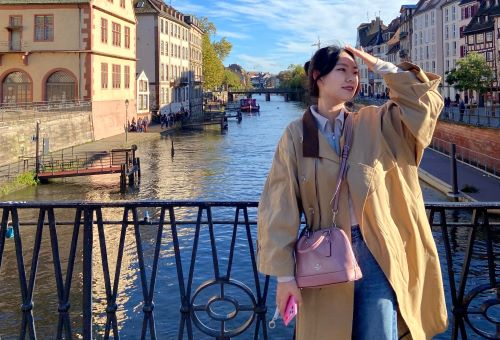
I loved the memory of my trip to Europe when I was in middle school, and that made me want to work in Europe in the future. For this reason, I decided to major in French language and literature, and I decided to go to France to use what I had learned in school. I applied for the Fall 2022 Global Language Program conducted by the Office of International Affairs at Chonnam National University (CNU) before the beginning of the Spring semester. One of the qualifications was DELF A2, a French language qualification test score. After being selected, there were various documents required in order to take classes and live in France for one semester.
Exciting Preparation to Study in France
First of all, I applied for a new passport and purchased a round-trip ticket about three months before departure. I submitted the dormitory application and ID photos, and signed up for ADH (assurances-étudiants), a French housing insurance. In addition, I signed up for CVEC (Contribution Vie étudiante et de Campus), a mandatory campus tax service to pay French university tuition, dormitory fees and ‘Visale’ to guarantee residency in France. In addition, I purchased travel insurance from a Korean insurance company. The most important thing was to obtain a student visa from the French Embassy in Korea. I prepared documents such as a passport and a passport photo, confirmation of the ‘Campus France’ interview, a letter of admission, proof of residency, an online visa application form and confirmation of interview application (rendez-vous).
Before leaving for France, I obtained an international student ID card through CNU’s website. Thanks to getting the card, I could get a discount for the flight ticket. The ID card was also very helpful while traveling around Europe. Some museums and art galleries were free to enter, and I could get a student discount on the train tickets, so I highly recommend it. I purchased two pieces of checked luggage at 25kg per piece as an option on my air ticket, and I took two 28 and 30-inch suitcases with me. I packed my clothes in a zip-type compression pack, and some kitchen appliances and household items such as a mini rice cooker, electric induction, and a ramen pot. I also prepared medicines for cold and digestion. I also brought gochujang, meat broth coins, tuna, seaweed, and canned food in case it might be difficult finding Korean food ingredients in France. However, there were many Asian markets, so I could easily get a lot of Korean food.
Making My First Step to France
After a 14-hour flight, I arrived at Charles de Gaulle Airport in France. It took about an hour to go through immigration and claim baggage. In my case, I had a student visa, so I passed the immigration quickly without any difficulty. Before the start of the semester, I traveled to Paris for a few days. I booked a Korean taxi in advance so it took me directly from the airport to the city. There are also other methods of transportation such as a subway or bus, but with heavy luggage in an unfamiliar place I recommend using a Korean taxi although it is a bit expensive. After taking a short trip to Paris, I took the TGV (French train) to the Franche-Comté University in Besançon. I carried a copy of the TGV train reservation that I had made in Korea in case of an emergency.
After arriving at The Franche-Comté University, I submitted the admission letter, proof of residence in the dormitory, application form, and a copy of my passport to move into the dormitory. In France, there are many cases where business is carried out through paper and postal mail, so keeping some photocopies of important documents can speed up the process. I kept copies of my passport, visa visale, school admission letter, dormitory residency certificate, and housing insurance.
Perfect Adaptation to Life in France
What I felt while studying in France is that taking classes at language schools is really important and helpful, but what really helped me was using French in everyday life. The process of trying to carry on a conversation somehow while speaking a mixture of English and French with other students, showing a translation and communicating slowly, listening to and asking questions about the language my peers actually use in daily life was really helpful. When I was studying in the dormitory lobby, I said “Bonjour” to other foreign students and I had small talk with them to build intimacy. Also, playing games with other foreign students and learning sports from coaches at the University Sports Center helped me a lot in learning vocabulary. Even asking questions to the clerk at a local mart and asking for help from people around me also greatly helped me to get rid of my fear of conversation.
I traveled to many countries in Europe. It was great experiencing exotic scenery, culture and food. Also, I was able to use the expressions and words I had learned while talking with the person sitting next to me on the train, the accommodation host, and the restaurant clerk. Words spoken in this way are more memorable. “Don’t be afraid.” This is my advice to anyone who is interested in studying abroad. You may feel intimidated in an unfamiliar environment, but if you really want to experience the culture and improve your language skills, it is important not to hesitate and try to say one more word.
By Oh Hye-jin, Junior, Department of French Language and Literature

